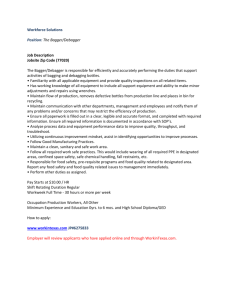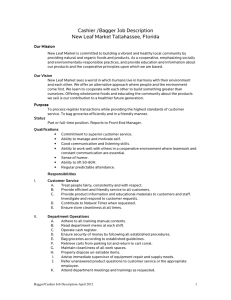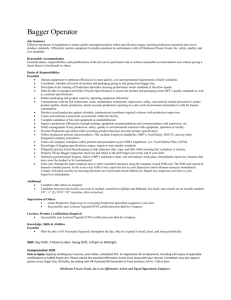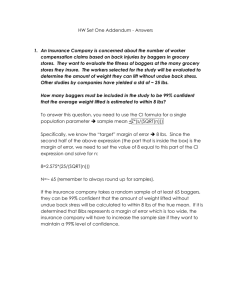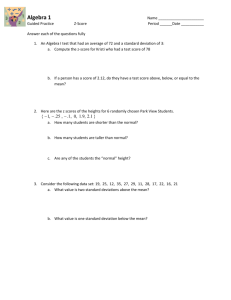Bagger Program - Commissaries.com
advertisement
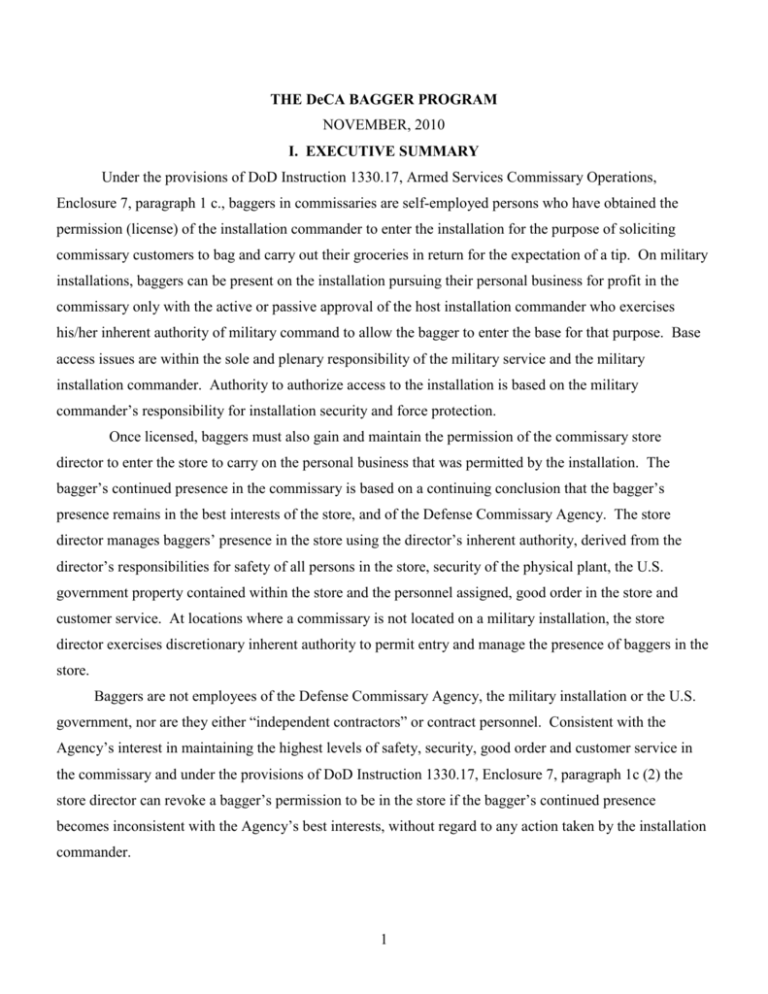
THE DeCA BAGGER PROGRAM NOVEMBER, 2010 I. EXECUTIVE SUMMARY Under the provisions of DoD Instruction 1330.17, Armed Services Commissary Operations, Enclosure 7, paragraph 1 c., baggers in commissaries are self-employed persons who have obtained the permission (license) of the installation commander to enter the installation for the purpose of soliciting commissary customers to bag and carry out their groceries in return for the expectation of a tip. On military installations, baggers can be present on the installation pursuing their personal business for profit in the commissary only with the active or passive approval of the host installation commander who exercises his/her inherent authority of military command to allow the bagger to enter the base for that purpose. Base access issues are within the sole and plenary responsibility of the military service and the military installation commander. Authority to authorize access to the installation is based on the military commander’s responsibility for installation security and force protection. Once licensed, baggers must also gain and maintain the permission of the commissary store director to enter the store to carry on the personal business that was permitted by the installation. The bagger’s continued presence in the commissary is based on a continuing conclusion that the bagger’s presence remains in the best interests of the store, and of the Defense Commissary Agency. The store director manages baggers’ presence in the store using the director’s inherent authority, derived from the director’s responsibilities for safety of all persons in the store, security of the physical plant, the U.S. government property contained within the store and the personnel assigned, good order in the store and customer service. At locations where a commissary is not located on a military installation, the store director exercises discretionary inherent authority to permit entry and manage the presence of baggers in the store. Baggers are not employees of the Defense Commissary Agency, the military installation or the U.S. government, nor are they either “independent contractors” or contract personnel. Consistent with the Agency’s interest in maintaining the highest levels of safety, security, good order and customer service in the commissary and under the provisions of DoD Instruction 1330.17, Enclosure 7, paragraph 1c (2) the store director can revoke a bagger’s permission to be in the store if the bagger’s continued presence becomes inconsistent with the Agency’s best interests, without regard to any action taken by the installation commander. 1 The Defense Commissary Agency has published core guidance on bagger operations for store directors in DeCA Directive 40-6, Customer Service Department, dated June 5, 2007, w/ Chg 1, April 2, 2009, Chapter 4 of that Directive, specifically paragraph 4-8 and its accompanying figures, contain guidance on the management of baggers in the store. The guidelines established in DoD Instruction 1330.17, DeCAD 40-6, and this guidance, assist the store director in implementing and maintaining a local bagger program. The previous version of this Bagger Overview, dated April 16, 2004, is superseded by this updated general guidance applicable to baggers and the management of baggers in commissary stores. II. BACKGROUND Baggers have a unique status on military installations. Importantly, baggers are neither employees of the Commissary nor of the military service. Formerly, some installations also permitted individuals to enter the base for such purposes as providing caddy services to golfers on installation golf courses. The caddies, much the same as the baggers, were paid for their services by tips from the golf patrons who “hired” them. Now, baggers in our stores exercise essentially the same function. Each bagger is engaged in the commercial solicitation of commissary customers. Upon solicitation of the customer, the bagger is voluntarily “hired” by the customer to bag and carry out the customer’s groceries in return for a tip. Just as with the caddy, baggers work for no one other than the customer who “hires” them. Even so, however, just as the caddy had to observe and honor rules set out for them at the installation golf club, the bagger is not totally autonomous in our stores. Historically, baggers have been present in military commissaries since at least the mid 1950’s. Consequently, commissary customers traditionally expect to see baggers in our stores, and overwhelmingly utilize their services on a strictly voluntary basis. In order to provide bagger and carry out services to commissary patrons at each installation, it is Defense Commissary Agency policy to allow persons who have been permitted to enter the installation for that purpose, to enter the store to solicit customers to bag and carry out their groceries in return for the expectancy of a tip, as a personal business for profit, Still, because of long held preconceived notions and superficial analyses of a bagger’s legal status, many misperceptions concerning a bagger’s presence in the commissary and on the installation persist. Some of our commissary customers, installation authorities, and, indeed, even some baggers themselves, mistakenly and superficially consider baggers to be somehow affiliated with the commissary as either employees or contractors. They are neither, and it is not in the best interest of the Agency to allow, or to promote, that misperception. To the extent the Agency is able, it must promote only the correct 2 identification of baggers as self-employed licensees of the installation commander who are present in the store to carry on their personal business for profit, i.e., soliciting customers to bag and carry out customers’ groceries. In order to establish consistent worldwide Agency bagger guidance, it has been the Agency’s practice to issue basic guidance in the form of an Agency Directive and supplement that guidance with additional helpful practical assistance from Headquarters Operations and the Office of General Counsel. In approximately 1994, and several times since, the Office of General Counsel has distributed basic bagger guidance and best practices developed at Fort Lee to all stores. Accomplishing this general oversight has been a constant effort since the formation of DeCA. Despite these continuous efforts, however, because of individual differences at installation level, the turnover of baggers, and the movement Commissary Management Personnel, as well as the continuing development of governing case law, efforts to maintain a locally based, locally implemented, but consistent, Agency approach to baggers is a demanding effort. To further facilitate the understanding of bagger operations by installations and others, the Agency prepared and distributed a “Bagger Q & A Fact Sheet” for interested parties (Available upon request). III. GENERAL The legal status of baggers is a complex issue. Rules applicable to baggers, while basic, are specific and technical. It has been Agency experience through several judicial challenges involving bagger status, in which, incidentally, the Agency has consistently prevailed, that certain functions of baggers can be required, permitted as a voluntary effort, or must be prohibited. The Office of General Counsel publishes these guidelines as memoranda, as appropriate. Because baggers are self-employed licensees and not employees or contractors, it is in the Agency’s best interests to limit the involvement of Agency managers in bagger affairs to those aspects of a bagger’s presence in the store that impact one or more of the Agency interests in safety, security, good order and customer service in the store. The Internal Revenue Service has also consistently recognized that baggers are neither DeCA nor U.S. government employees for the purposes of withholding income tax. Similarly, the courts have consistently held that baggers are not employees of the commissary, or the U.S. government, for purposes of the Fair Labor Standards Act (FLSA). This is due primarily to a note in the FLSA law that specifically addresses commissary baggers as not being subject to fair labor standards while baggers are engaged in bagging and carrying out customers’ groceries. This footnote to the Fair Labor Standards Act provision at 29 United States Code Section 203, Definitions, provides that: 3 “Status of commissary baggers. Act Oct. 20, 1978, P.L. 95-485, Title VIII, 92 Stat. 1626, provided that: "Notwithstanding any other provision of law, an individual who performs bagger or carryout service for patrons of a commissary of a military department may not be considered to be an employee for purposes of the Fair Labor Standards Act of 1938 [29 USCS § § 201 et seq.] by virtue of such service if the sole compensation of such individual for such service is derived from tips." IV. CURRENT STATUS As result of judicial litigation, and the application of existing Federal law, rule, and regulation, it has been the Agency practice to allow local implementation and local autonomy of each installation bagger program, based on centralized, general Agency guidance and internal procedures. This seemed to be the best formula for an efficient and effective bagger operation. This has resulted in carry out assistance to customers while providing the necessary protections to Agency against challenges by baggers and others, who would place upon the Agency duties and fiscal responsibilities it does not bear. For example, the Agency has found that its policy of diversified independent local implementation, with centralized control of bagger programs based on core Agency guidance, protects the Agency in the judicial discovery processes. This “legal technicality” is a tremendous advantage to the government and greatly protects the Agency while complicating a challenger’s ability to gather information with which to mount an action to have baggers considered to be employees. Such a determination could theoretically result in a third party decision that baggers are to be considered de facto employees entitled to Federal minimum wage, overtime pay, income tax withholding, as well as the other indicia and benefits of Federal employment. Considering that there are potentially ten thousand full, part-time or occasional baggers in the worldwide commissary system, the Agency cannot risk such a judicial finding. The more the Agency permits a perception, through its actions, that indicates baggers may be affiliated with it in an employment or a quasi-employment relationship, the more real this vulnerability becomes. With that in mind, the Agency has published three collateral practical items of guidance, initially developed by the United States Army at Fort Lee. The Agency has distributed them to all stores in the past. The guidance forms suggestions for a locally administered bagger program acceptable to the installation, consistent with the installation’s interest in security and force protection yet allows DeCA to remain independent of complete oversight in its bagger program. Those items are: 1. A sample Standard Operating Procedure (SOP) for the installation that it can use to control the ingress, egress and acceptability of baggers on the installation; (available upon request); 4 2. A sample application form for prospective baggers that the installation can to use to vet individual bagger applicants to ensure security interests are protected (available upon request); and 3. A sample Standard Operating Procedure (SOP) for use by head baggers and individual baggers in the store to set out the basic instructions and training of baggers (available upon request). Although these suggestions have been issued to all stores with instructions to share them with their host installation, some installations modified the guidance, some rejected it, and some incorporated the suggestions into their own security and force protection programs. In all cases where the suggestions were accepted, or modified and accepted, the bagger programs are functioning successfully with a minimum of continuing active involvement of either the installation or DeCA authorities. Another area of strong DeCA interest is the quality of bagger and carryout services rendered by persons whom store directors permit into our stores to solicit our customers. Because the persons being solicited are our customers, the Agency is naturally concerned with the quality of the services provided, even though it is clear that baggers are licensees, and are neither military service nor Defense Commissary Agency employees. Because baggers are not U.S. government employees, the Agency is restricted from using appropriated fund dollars to either train them, or provide them accoutrements such as identifying hats, smocks and other clothing, even though it is our customers whom they solicit and serve. At the same time, because world-class customer service is one of the premier Agency goals, each Agency region presents customer service training for its Agency employees engaged in customer-contact duties. When this training is presented at store level, it can be made available to baggers on a space available basis, so long as there is no additional cost to the Agency. Additionally, each store director is encouraged to tell their head bagger that quality service in the solicitation of our customers is a condition for continued permission to remain in our store to solicit those customers. In the final analysis, it is not in our Agency’s best interests to permit persons to come into our stores to carry on their own personal business for profit if they cannot, or will not, provide the best service possible to our customers. Thus, it has been Agency practice to provide basic centralized core guidance with local and independent implementation. In virtually all of our stores, this process is successful. V. THE ROLE OF THE INSTALLATION COMMANDER Each installation commander exercises the inherent authority of military command on the installation to create local rules and regulations for baggers, as a prerequisite to the grant of permission to 5 enter the base. Because each installation has the responsibility under DoD Instruction, as well as under the inherent authority of military command, to institute its own entry and vetting requirements for persons wishing to come on the installation for personal gain, including baggers, the Agency has no control over that process. Thereafter, the prospective, but licensed bagger requests permission to enter the commissary for the purpose of soliciting our customers to bag and carry out their groceries. This independent installation-based responsibility counsels against a “one size fits all” approach to bagger operations, even for our own stores. Occasionally, the Defense Commissary Agency will publish nonbinding, suggestive guidance for use by installation commanders. The first such guidance was contained in a memorandum from the Director, Subject: Bagger and Carry-Out Service and Force Protection, dated April 14, 2003 (available upon request). VI. THE ROLE OF THE STORE DIRECTOR The commissary store director, in turn, has management control over the self-employed baggers who enter the store to the extent that a bagger’s conduct or performance negatively impacts the safety, security, good order and customer service of the store. Each bagger is subject to certain rules as described in the Memorandum of Understanding for baggers contained in DeCAD 40-6, Chapter 4, figure 4-1. Where the store director considers a bagger’s continued presence in the store to be no longer in the best interests of the store or the Agency, the store director can revoke the bagger’s permission to enter the store for the purpose of soliciting commissary customers to bag and carry out their groceries. Despite the clear guidance of DoD Instruction 1330.17, that generally baggers should possess a valid military ID card or have some other visible affiliation to the military, all baggers may not simultaneously be bona fide patrons of the commissary in their own right. Therefore, baggers are generally not permitted to enter the retail store sales area or any other area, other than the space beyond the point of sale and prior to the exit doors. VII. THE ROLE OF THE HEAD BAGGER The corner stone in the agency’s ability to manage the bagger presence in a commissary as a selfemployed licensee of the installation commander is the election of a head bagger by the baggers who are currently permitted to bag groceries in the commissary. A free and fair election of a head bagger voluntarily shifts responsibilities from the baggers at large to the head bagger. By virtue of the election, the elected head bagger is empowered to schedule baggers to work, to train baggers, to exercise basic control over the group, and to be generally responsive to store management for the day-to-day operation of the local bagger 6 program. The head bagger, while elected by the baggers at large, remains only a bagger and can exercise no independent authority to permit, or to revoke the permission of, any individual to enter the store as a bagger. For example, to maintain order in the store, the head bagger schedules baggers when they want to work. Baggers as self-employed persons work for themselves when they want to. Through the election, however, the head bagger can schedule bagger work hours consistent with the customer need in the store. Similarly, in some locations the head bagger has a sufficient number of administrative duties as the liaison between the baggers and store management that a daily sum of money is given the head bagger by each bagger present for work. That amount is agreed upon through the election. Finally, the head bagger is the first point of contact for a person who desires to become a bagger at the store. The head bagger maintains a list of prospective baggers. When a position becomes available, the head bagger contacts the prospective bagger on a first signed up, first called, basis. The head bagger then provides the prospective bagger with the locally required installation application forms necessary to secure the permission of the installation commander to enter the installation for the purpose of carrying on the personal business of bagging and carrying out commissary customers’ groceries. Thereafter, upon receiving the license from the installation commander, the store director exercises additional discretion to permit the licensed bagger to enter the store. Other responsibilities of the head bagger include: 1. Communicating with baggers concerning appropriate behavior, dress, and adequate customer service. 2. Administering a locally developed Standard Operating Procedure (SOP) agreed upon by the baggers and approved by the store director. 3. Maintaining good order among the baggers. 4. Ensuring that only licensed baggers are permitted to enter the store. 5. Recommending to the store director the suspension or revocation of a bagger’s permission to enter the store. VIII. CONCLUSION As stated above, it is in the Agency’s best interests to facilitate safety, security, good order and customer service in the store and among baggers. The store director exercises management control discretion over baggers and others present in the store utilizing the inherent authority of the position of store director. The store director is able to exercise this authority without instituting practices that could lead a 7 third party to conclude there is an employer-employee relationship between the Agency and baggers. This discretion must be exercised by the store director, or by one delegated the authority by the store director. Nonetheless, practically speaking, store management and the head bagger of a well run operation in one of our stores ensures the Agency’s interests in safety, security, good order and customer service are well protected and promoted for the benefit of the agency, its customers and the baggers as a group. This, process, in turn, tends to maximize the expectancy of tips for baggers from customers in response to the rendering of efficient, effective and courteous bagger and carry-out services to our customers. (Documents referred to herein are available upon request) PHILIP F. KOREN Principal Deputy General Counsel Defense Commissary Agency Fort Lee, Virginia, 23801 (804) 734-8000, X48116 8
